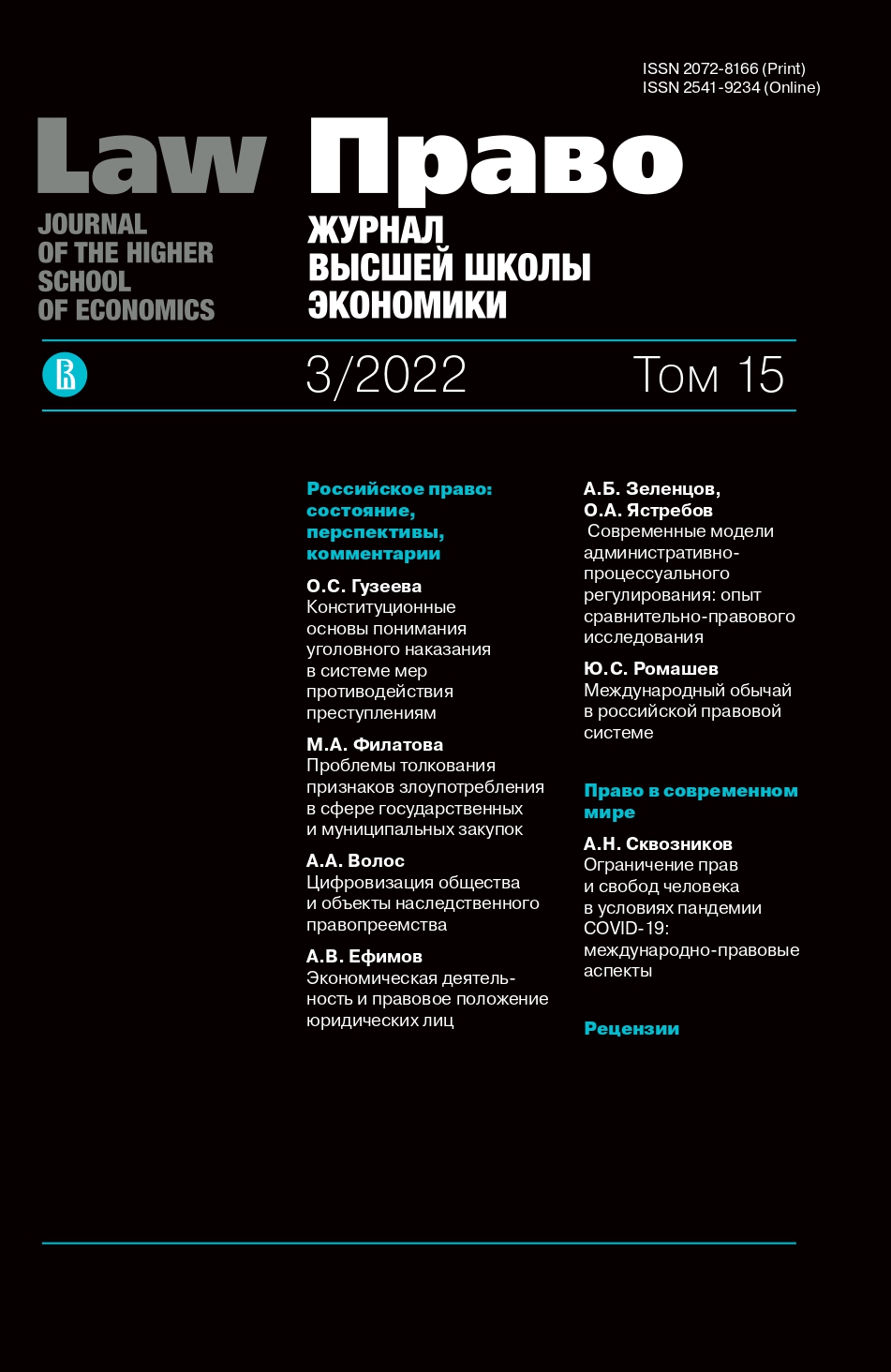Ограничение прав и свобод человека в условиях пандемии COVID-19: международно-правовые аспекты
Аннотация
Целью работы является изучение института ограничения прав человека и основных свобод при чрезвычайной опасности общественному здоровью, а также правовых оснований и пределов таких ограничений в доктрине международного права. Эмпирической основой исследования стали нормы международных договоров и иных правовых актов, а также материалы зарубежных периодических изданий. Институт прав и свобод человека в условиях пандемии COVID-19 подвергается серьезной трансформации, результатом которой может стать появление новой парадигмы прав человека. Многие государства, являющиеся родоначальниками европейского гуманизма, на котором основано современное международное право, под влиянием пандемии постепенно отходят от его базового принципа о признании человека в качестве высшей ценности, реализуемого через идею автономии и универсальности личности. Некоторые современные государства активно культивируют иные по сравнению с европейским гуманизмом ценности и принципы, в которых в качестве приоритета выступает общественное (коллективное) благо, в частности, здоровье всего общества, при ограничении автономии личности и индивидуальных прав. Научная новизна работы состоит в обосновании условий ограничений прав человека и основных свобод при глобальной угрозе общественному здоровью в форме пандемии. Практическое значение исследования состоит в том, что были выявлены существенные противоречия между должным (формальным) порядком по ограничению прав и свобод человека, установленным международным правом, и фактически сложившейся ранее практикой субъектов международного права. Преодоление данных противоречий возможно только путем неукоснительного соблюдения норм и принципов международного права. Автором выявлены существенные изменения политико-правовой сущности современного государства. Констатируется, что модель государства, сложившаяся в период Нового времени, подвергается серьезной трансформации: концепция общественного договора, основанная на ограничении государственной власти в интересах личности, все больше уступает место неограниченному праву вмешательства государства в частную жизнь.
Литература
Anichkin E.S. (2021) Constitutional status of an individual in the context of coronavirus pandemic: vectors of transformation in Russia. Pravoprimenenie=Law Enforcement, vol. 5, no. 3, pp. 101-111 (in Russ.) DOI: https://doi.org/10.52468/2542-1514.2021.5(3).101-111
Blassime A., Vaena E. (2020) What's next for COVID-19 apps? Governance and oversight. Science, no. 13, pp. 760-762. DOI: https://doi.org/10.1126/science.abd9006
Braun M., Hummel P. (2020) Contact-tracing apps: contested answers to ethical questions. Nature, no. 583 (7816), p. 360. DOI: https://doi.org/10.1038/d41586-020-02084-z
Devi S. (2020) Travel restrictions hampering COVID-19 response. Lancet, no. 395 (10233), pp. 1331-1332. DOI: https://doi.org/10.1016/S0140-6736(20)30967-3
Doroshenko E.N. (2020) Constitutional Law Foundations for the Restriction of Human Rights in Connection with the New COVID-19 Pandemic. Aknualnye problemy rossiyskogo prava=Current Issues of Russian Law, no. 12, pp. 48-56 (in Russ.) DOI: https://doi.org/10.17803/1994-1471.2020.121.12.048-056
Gretsova E. E. (2009) Lawful restrictions on human rights and freedoms in international law. Candidate of Juridical Sciences Summary. Moscow, 26 p. (in Russ.)
Habibi R., Burci, G., de Campos T. et al. (2020) Do not violate the International Health Regulations during the COVID-19 outbreak. Lancet, no. 395 (10225), pp. 664-666. DOI: https://doi.org/10.1016/S0140-6736(20)30373-1
Kornienko A.S., Samokhvalov N.A. (2021) COVID-19: Legal Regulation of Universal Vaccination. Pravo. Zhurnal Vysshey shkoly ekonomiki=Law. Journal of the Higher School of Economics, no. 5, pp. 148-166 (in Russ.) DOI: https://doi.org/10.17323/2072-8166.2021.5.148.166
Lapaeva V.V. (2021) The Law of a Technogenic Civilization to Face Technological Dehumanization Challenges. Pravo. Zhurnal Vysshey shkoly ekonomiki=Law. Journal of the Higher School of Economics, vol. 14, no. 3, pp. 4-35 (in Russ.) DOI: https://doi.org/10.17323/2713-2749.2021.3.3.32
Latypova N.S. (2021) Protecting human rights during COVID-19 pandemic. Yuridicheskaya nauka v Kitae i Rossii=Legal Science in China and Russia, no. 4, pp. 96-100 (in Russ.) DOI: https://doi.org/10.17803/2587-9723.2021.4.096-100
Labs J., Terry S. (2020) Privacy in the Coronavirus Era. Genetic Testing and Molecular Biomarkers, no. 9, pp. 535-536. DOI: https://doi.org/10.1089/gtmb.2020.29055.sjt
Lipinsky D.A., Makareiko N.V., Popov I.E. (2021) Legal responsibility in the mechanism of countering modern threats to national security: a new coronavirus infection. Administrativnoe pravo and administrativnaya praktika=Administrative law and administration, no. 1, pp. 25-35 (in Russ.) DOI: https://doi.org/10.7256/2306-9945.2021.1.35424
Meier B., Habibi R., Yang Y. (2020) Travel restrictions violate international law. Science, no. 367 (6485), p. 1436. DOI: https://doi.org/10.1126/science.abb6950
Morley J., Cowls J., Taddeo M. et al. (2020) Ethical guidelines for COVID-19 tracing apps. Nature, no. 582, pp. 29-31. DOI: https://doi.org/10.1038/d41586-020-01578-0
Park S.et al. (2020) Information Technology-Based Tracing Strategy in Response to COVID-19 in South Korea-Privacy Controversies. Journal of American Medical Association, no. 323, pp. 2129-2130. DOI: https://doi.org/10.1001/jama.2020.6602
Popov M.Yu., Samygin P.S., Samygin S.I. (2020) The discussion on the limitation of human rights and freedoms in pandemic times. Gumanitarnye, socialno-economicheskie i obschestvennye nauki=Humanities, socio-economic and social sciences, no. 4, pp. 142-147 (in Russ.)
Razdyakonova E.V., Rudt Y.A. (2021) Human rights and the pandemic: in search of balance and a new legal paradigm. Pravo / zakon=Law and Statute, no. 8, pp. 48-55 (in Russ.)
Romashev Yu.S. (2013) Restrictions on fundamental human rights and freedoms in international law and innovations in Russian criminal law. Zhurnal rossiyskogo prava=Journal of Russian law, no. 11, pp. 75-84 (in Russ.) DOI: https://doi.org/10.12737/1209
Tolstykh V.L. (2022) COVID-19 and International Law: Special Issues. Moskovskiy zhurnal mezhnarodnogo prava=Moscow Journal of International Law, no. 1, pp. 128-142 (in Russ.)
Umarova A.A. (2011) Standards of restrictions on rights and freedoms in acts of modern international law. Probely v rossiyskom zakonodatelstve=The gaps in the Russian legislation, no. 2, pp. 40-43 (in Russ.)
Vasilevich G.A., Ostapovich I.Yu., Kalinina E.G. (2021) Coronavirus pandemic as a reason for limitation of human rights and freedoms. Pravoprimenenie=Law Enforcement, no. 2, pp. 62-76 (in Russ.) DOI: https://doi.org/10.52468/2542-1514.2021.5(2).62-76
Yagofarova I.D. (2019) On the issue of the limitation of restrictions on human rights and freedoms. Bulleten' informatcionnykh technologiy=Information Technology Bulletin, vol. 2, no. 10, pp. 79-82 (in Russ.)
Zorkin V.D. (2019) The right of metamodernity. Lecture at the IX St. Petersburg legal forum. Available at: http://www.ksrf.ru/ru/News/Speech/Pages/ViewItem.aspx?Para-mId=86 (in Russ.)
Copyright (c) 2022 Право. Журнал Высшей школы экономики

Это произведение доступно по лицензии Creative Commons «Attribution-ShareAlike» («Атрибуция — На тех же условиях») 4.0 Всемирная.


















